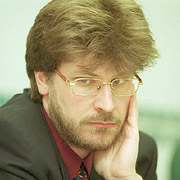© «Russia in
Global Affairs». № 4, October — December 2008
 Two crises have
Two crises have
occurred one after the other in the past few months that have had a
significant impact on Russian foreign policy. The Russian-Georgian
war in August and the upheavals on global financial markets in
September and October are not related. Yet both events, each in its
own way, have contributed to the formulation by Russia of its
national interests. One can say that the two crises have set a
conceptual framework of interests, defining a vector for the
indispensable and boundaries for the possible.
The Georgian attack against South Ossetia and the world reaction
to Russia’s response have created a new mood in Russian politics
and public opinion. Perhaps never before have Russia and the West
had such a deep clash in perceptions as now. For the first time
since the breakup of the Soviet Union, Moscow found itself in a
situation where it had to act without regard to the possible costs
of world reaction. This time the Kremlin decided that taking
actions approved of by its foreign partners would cost too much
from the point of view of the country’s vital interests. Moreover,
most likely it was impossible to uphold these interests without
coming into conflict with major international partners.
At the same time, there must be clear criteria for judging what
interests are vital and should be upheld whatever the cost. Russia
is a country that is still in progress and it does not have such
clear criteria yet, although the process is already underway. The
financial crisis has played an important role in this regard.
The financial instability that has rapidly spread throughout the
world has shown the degree of global interdependence and the limits
of economic and, as a consequence, geopolitical capabilities. It
has turned out, for example, that the huge financial resources
accumulated over the years of sustained economic growth may be
enough to alleviate the consequences of the national crisis. Yet it
is not enough to implement major geopolitical projects planned in
recent years.
The reality of the crisis will cause countries to set priorities
better, rank their intentions, and give up secondary tasks in favor
of more important ones. A positive side to the financial crisis is
that the world has renewed discussions about the need to modernize
global governance institutions. Russia has been talking about the
decline of the existing institutions for a long time, but no one
has ever heeded its warnings.
The financial crisis can cause all countries, including Russia,
to realize their collective interests and the need for multilateral
action. Otherwise the world will see a further aggravation of the
chaos and growing competition, which – amid conditions of
interdependence – may have highly dangerous consequences.
Sergei Karaganov maps out in his article a general agenda for
the leading world powers in a new era of economic and political
instability. Following up on this subject, Sir Roderic Lyne writes
that the realities of the crisis make it necessary to rethink
Russian-Western relations. Alexander Lukin proclaims the end of the
post-Soviet phase in Russian foreign policy. From now on, he
argues, foreign policy will be neither anti- nor pro-Western, and
Russia will have to formulate its own objectives. Alexander
Aksenyonok analyzes the South Ossetian tragedy in the context of
the general degradation of the world system over the last two
decades. The author does not rule out a fundamental change of the
paradigm in the Kremlin’s foreign policy. Vladimir Ovchinsky
describes August 8, 2008 as “September 11, 2001 in reverse” for
Russia. He believes that “the international anti-terrorist
coalition” can now be scrapped.
Ivan Safranchuk analyzes Russian-U.S. relations and says the era
is over when both countries declared that they were in “one boat.”
Now Moscow and Washington will not even pretend that they
coordinate their policies. Sergei Dubinin, on the contrary, is
confident that now is the time for establishing a serious and equal
alliance between Russia and the United States. Timofei Bordachev
points out that a strategic alliance between Russia and the
European Union would guarantee stability in Eurasia, whereas U.S.
desire to retain control over the Old World would play a
destabilizing role on the continent. Alexander Lomanov considers
the prospects for a U.S.-Chinese “Big Duo” – the theoretical
possibility of a joint dominance by these two countries over the
world, now being discussed in both China and the U.S.
The significance of the August events in the Caucasus for the
former Soviet Union is difficult to overestimate. Ivan Kotlyarov
analyzes various aspects of the Caucasian crisis. Alexei Vlassov
believes that time has come for the former Soviet republics to make
a choice, as room for multi-vector policies is getting narrower.
David Erkomaishvili sees a new chance for reintegration, which is
the only way Russia can regain the status of a really great power.
Sergei Markedonov argues that the war in South Ossetia and
subsequent developments have annulled the main principle on which
relative stability was based in the post-Soviet era – the
inviolability of Soviet administrative borders. Alexei Miller
discusses the situation in Ukraine, where the potential for
instability is very great.
Our next issue will focus on the global financial crisis and its
consequences for Russia and the rest of the world.










